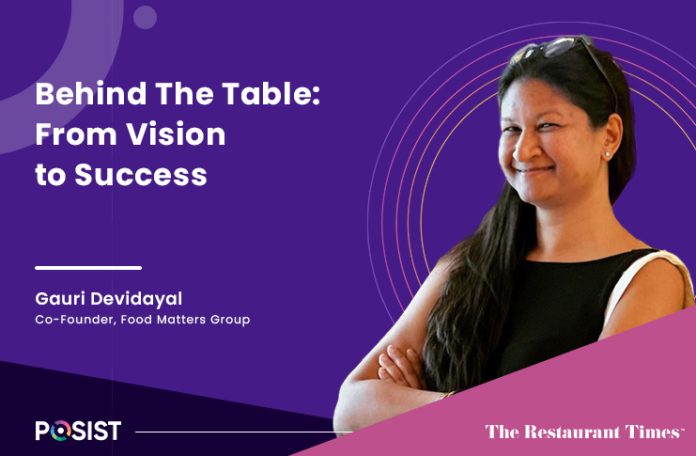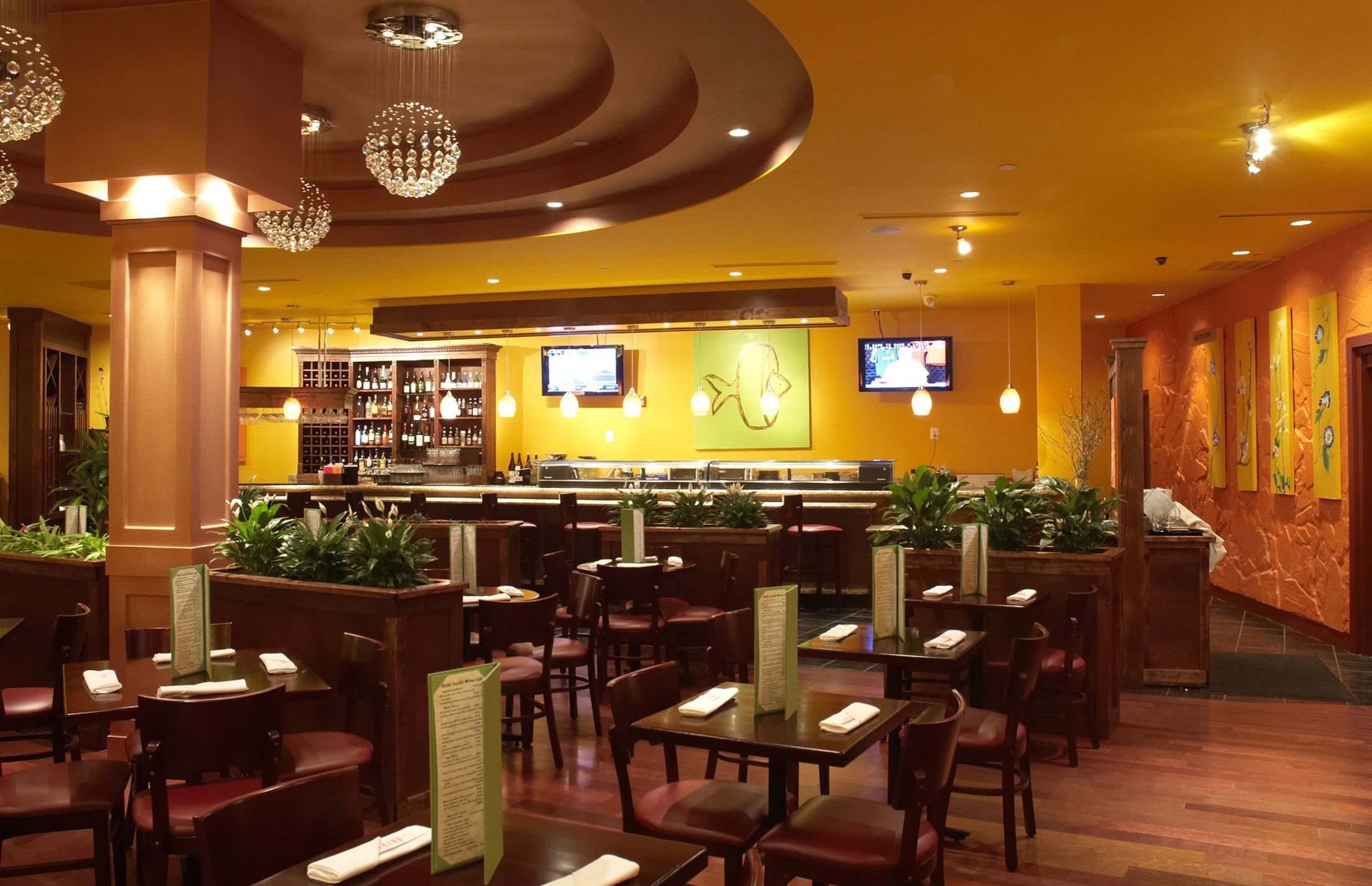Gauri Devidayal, an accomplished entrepreneur, author, and influential figure in the Indian restaurant industry, serves as a beacon of inspiration for women everywhere. Overcoming various challenges, she achieved remarkable success as a wife, mother, and professional. Gauri’s book, “Diamonds for Breakfast,” and her renowned restaurant have garnered numerous accolades, including prestigious mentions in Forbes’ “120 Leaders of Change,” G. Queues’ “50 Most Influential Young Indians,” and Black Book’s “Top 50 Women in Leadership.” Additionally, she holds the position of joint secretary at the National Restaurant Association of India.
With a law degree and fellowship from the Institute of Chartered Accountants in England and Wales, Gauri worked as a tax consultant with PWC in London and Mumbai for eight years. In 2008, she returned to Mumbai without prior experience in the hospitality industry or aspirations of becoming an entrepreneur. However, she fearlessly joined her husband in their restaurant venture. This bold decision led to the establishment of one of Mumbai’s most cherished dining establishments and propelled Gauri into a successful career as an entrepreneur, author, and respected leader in the Indian restaurant industry.
In a conversation with Gauri Devidayal, Co-Founder, Food Matters Group
Food Matters Group. is a Mumbai-based hospitality company founded in 2011 by Gauri Devidayal and Jay Yousuf. Gauri Devidyal has successfully made her mark in a predominantly male-dominated industry by navigating career transitions, international relocations, and establishing one of India’s most beloved food and beverage brands. We had the opportunity to ask her a few questions:
TRT: Can you provide further details about your book, Diamonds for Breakfast, including the inspiration behind it and how the idea came to fruition?
Gauri Devidayal: The idea for Diamonds for Breakfast arose as a way to celebrate the 10-year anniversary of our restaurant, The Table. We wanted to share the incredible stories and journeys of the past decade through engaging narratives.
However, due to the impact of the COVID-19 pandemic, the project was put on hold. Nonetheless, we resumed work on the book, and it was released shortly after our 12-year anniversary. Throughout the writing process, I realized that there are numerous misconceptions about running a restaurant. My intention with this book is to provide a deeper understanding of the realities of the industry.
TRT: Considering the challenging nature of the restaurant business, where owners and staff must work tirelessly, how do you strike a balance between maintaining competitiveness and profitability while offering high-quality and unique dishes? Additionally, we’ve heard that The Table sources its ingredients locally. How do you manage to juggle all these factors?
Gauri Devidayal: “Starting a restaurant is a demanding endeavor that requires significant capital and hard work, especially for individuals new to the industry.” When the founders of The Table began their venture, they drew inspiration from the ingredient-driven approach of California-style cuisine. This concept was relatively new in their city, where most restaurants were focused on specific cuisines like Italian, Chinese, or Indian. However, they were passionate about creating an ingredient-driven restaurant, making it a personal pursuit.
Despite their lack of prior experience in the restaurant industry, they were determined to turn their vision into reality. However, profitability was not their primary concern at the initial stages. Their focus was on perfecting the concept and maintaining unwavering standards for ingredient quality, service, and their overall vision. This decision led them to face a steep learning curve and make significant upfront investments, exerting pressure to recoup costs and achieve profitability within a reasonable timeframe.
The restaurant business is notoriously challenging, and it’s common for restaurants to experience an initial honeymoon period before encountering inconsistencies and obstacles. However, according to the founders, consistency is the key to success. While maintaining consistency may come with higher costs and increased effort, it is truly worthwhile and has enabled the restaurant to earn the loyalty of its guests.
In summary, starting a restaurant demands immense dedication, capital, and a steadfast commitment to consistency. While profitability is important, it shouldn’t be the primary focus during the initial stages. Instead, emphasis should be placed on refining the concept, upholding ingredient quality and service, and remaining true to the vision. Despite the challenges and hurdles along the way, it’s possible to achieve success in the restaurant industry through perseverance and unwavering determination.

TRT: Why is consistency considered crucial for success in the restaurant industry?
Gauri Devidayal: Consistency is paramount for success in the restaurant industry because it fosters strong customer relationships. Dining out is not solely about food; it’s an experience that creates lasting memories. When customers have positive experiences at a restaurant, they are more likely to return. Consistency in food quality, service, and overall experience is vital to recreating those positive moments. By consistently delivering high-quality experiences, restaurants build trust with their customers, which is key to retaining existing patrons and attracting new ones.
TRT: How does your restaurant maintain strong customer and community relationships, and how do you respond to feedback and adapt to changes?
Gauri Devidayal: Building a strong relationship with our customers and the local community is essential for our restaurant’s success. Authenticity plays a significant role in creating a sense of comfort and connection. We strive to make our guests feel at home by carefully curating the ambiance, decor, and demeanor of our staff.
In addition, we highly value customer feedback and actively seek it out. Listening to our customers’ opinions and suggestions is crucial for improving their dining experience. We encourage feedback through online review platforms and engage in personal conversations to understand their needs.
Furthermore, adapting to changes is vital. We stay updated with industry trends and innovations, ensuring that we remain ahead of the curve. By understanding the evolving needs and preferences of our local community, we can tailor our menu, decor, and services to better serve them. This proactive approach helps us cultivate a loyal and devoted customer base.
TRT: What steps do you take to maintain strong relationships with customers, the community, and people, and how do you respond to feedback and adapt to their changing needs and preferences?
Gauri Devidayal: Building strong relationships with customers and the community is paramount in the restaurant industry. It begins with creating an authentic and welcoming atmosphere that makes guests feel at home. Our team is trained to connect with people, anticipate their needs, and provide exceptional service.
We believe in paying attention to the details, from lighting to music, to create a unique and memorable experience. Feedback from our guests is invaluable, and we actively seek it out. We listen to their suggestions and make adjustments to our menu and restaurant accordingly.
Flexibility and responsiveness to their evolving needs and preferences are key.

TRT: You mentioned transitioning from a career in law and tax consulting to the F&B industry. What inspired this switch, and how did your previous experiences and education shape your approach to this new venture?
Gauri Devidayal: Initially, it was my husband’s idea to open a restaurant when he returned to India from the US. Despite my initial skepticism, I recognized the potential of the Indian dining scene and decided to join him. Although I lacked experience in F&B, we saw an opportunity to create something unique in the industry.
My background in law and tax consulting provided a strong foundation for this new venture. It instilled in me a sense of discipline, attention to detail, and problem-solving skills. These qualities shaped our approach to running a restaurant, from managing finances to legal compliance.
Moreover, our previous experiences taught us the value of adaptability and continuous learning. We are always evolving to meet the changing needs and preferences of our customers, ensuring that we provide an exceptional dining experience.
In summary, our transition into the F&B industry was driven by recognizing opportunities and taking calculated risks. My legal and tax consulting background equipped us with the necessary skills and mindset to succeed, while our commitment to customer feedback and adaptability remains fundamental to our ongoing journey.
TRT: Can you provide insights into the challenges faced when starting the Food Matters Group and the strategies used to overcome them?
Gauri Devidayal: The Food Matters Group has encountered various challenges since its inception, particularly during the COVID-19 pandemic. Adapting to the changing circumstances, we launched four delivery brands, demonstrating flexibility and resilience.
Another significant challenge has been building and retaining a strong team as the company expanded. Identifying the right people, nurturing positive company culture, and ensuring employee retention have been essential to our success.
While each new brand and location presents unique challenges, our ability to adapt and evolve has been key. Despite the growth, we remain focused on maintaining our commitment to serving high-quality food and building strong customer relationships.
TRT: How do you balance and prioritize projects across the different brands and ventures of Food Matters Group?
Gauri Devidayal: Balancing and prioritizing projects across multiple brands and ventures requires passion, effective delegation, and time management. A genuine passion for the business fuels the dedication needed to handle diverse projects.
Delegation is crucial as the business grows. Building a trusted team allows for effective management and frees up time to focus on higher-level tasks.
Continual personal and professional growth is essential. Embracing curiosity, being open to new ideas, and knowing your limits help in prioritizing tasks and managing time effectively.
Overall, it’s a combination of passion, delegation, and personal growth that enables the successful management of multiple projects in a dynamic industry.
TRT: What are some of the key lessons you have learned as a business owner and entrepreneur throughout your journey in the food industry?
Gauri Devidayal: As an experienced business owner and entrepreneur, there are several key lessons that I’ve learned that I would like to share with others who are interested in getting into the industry. One of the most important things to keep in mind is to do it for the right reasons. Many people may be attracted to the glamor and excitement of the restaurant industry, but it’s important to understand that there’s much more to it than what you see on the surface.
Another crucial lesson is that resilience is key. This means having the ability to bounce back from setbacks and to keep going even when things get tough. As a restaurant owner, there will be many challenges and obstacles that you’ll need to face on a daily basis. From dealing with difficult customers and managing staff to navigating the constantly changing landscape of the industry, you need to be able to adapt and stay focused on your goals.
It’s also important to be passionate about what you do. As I mentioned earlier, feeding people is such a pleasure, and it’s incredibly rewarding to see your customers enjoying the food and experience that you’ve created. But passion alone isn’t enough. You also need to have a strong work ethic and be willing to put in the long hours and hard work required to make your business a success.
In addition, delegation is key as you scale up your business. It’s impossible to do everything yourself, so you need to be able to build a team of people you can trust, who share your vision and can help you achieve your goals. This means finding the right people and empowering them to take on responsibilities so that you can focus on growing your business and taking it to the next level.
Finally, I would say that it’s important to stay humble and to keep learning. No matter how successful you are, there’s always room for improvement, and there’s always something new to learn. Whether it’s trying out new recipes, exploring new cuisines, or learning about the latest industry trends, staying curious and open-minded can help you stay ahead of the curve and keep your business thriving.
TRT: What are the future goals and aspirations for the Food Matters Group and its various brands, and how do you plan to achieve them?
Gauri Devidayal: As a business owner, it’s important to have goals and aspirations for the future, but it’s also important to remain flexible and adaptable to changing circumstances. The Food Matters Group has always taken a non-conventional approach to expansion, which means that they don’t have a specific five-year plan for their brands.
Ultimately, the Food Matters Group’s goal is to continue delivering high-quality food and experiences to its customers while also maintaining its unique approach to business and expansion. As the industry continues to evolve and change, it will remain adaptable and ready to take on new challenges and opportunities.
TRT: What advice would you give to budding restaurateurs?
Gauri Devidayal: “You have to do it.” You have to grow thick skin and never compromise on consistency and quality. These are the fundamental keys to success in this business. Dropping the ball on either of these will be the death of your venture. So keep pushing forward and never settle for anything less than excellence.

















